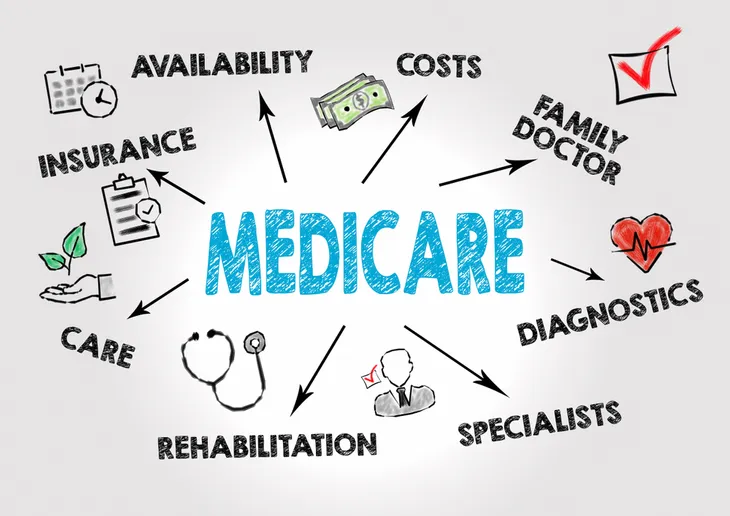Are you enrolling in Medicare this year? Medicare is a big program with many different rules and options which can make choosing a plan confusing and difficult. But Don’t fret, we’re here to help!
There are several Medicare plans to choose from but ultimately it comes down to your medical needs and what you can financially afford. Follow along as we break down each plan so you can find the perfect coverage that meets your needs. Here are the Medicare Plans seniors should consider
Want senior content delivered straight to your inbox? Sign up for our exclusive email list and receive articles and news on diet & nutrition, fitness, and mental health dedicated specifically to our senior audience!
What is Medicare
Before we dive into the top plans to choose from, you’ll want to have an understanding of what Medicare is. In short, Medicare is a federal health insurance program for people who are 65 and older, people with End-Stage Renal Disease (ESRD), and for certain younger people with disabilities.
To be eligible for Medicare you must fall in one of the above categories and you must also be a U.S. citizen or permanent legal resident. Keep in mind, permanent residents must have lived in the United States for at least five consecutive years. To learn more, check out everything you need to know about Medicare.
Medicare Part A
In short, Medicare Part A covers a variety of hospital services including inpatient care in a hospital. But that’s not all, Part A also covers hospice care, short-term skilled nursing facility care, some home health care, and nursing home care.
What’s great about this plan, is most people who have worked for 10 or more years won’t have to pay a premium for Part A. Although keep in mind, you may encounter some out of pocket expenses as this plan doesn’t cover everything.
If you haven’t worked long enough to qualify for the premium-free plan you can still qualify if you are (or were) married to someone who did. Finally, if you still don’t qualify you can enroll in this plan but you’ll have to pay a monthly premium.
Medicare Part B
Part B covers two types of services: medically necessary services, and preventive services. According to Medicare.gov, Medically necessary services include “Services or supplies that are needed to diagnose or treat your medical condition and that meet accepted standards of medical practice.” Whereas preventive services are “Health care to prevent illness (like the flu) or detect it at an early stage, when treatment is most likely to work best.”
This plan will cover things like ambulance services, durable medical equipment, mental health, clinical research, and limited outpatient prescription drugs. If you enroll for Part B, you will have to pay a monthly premium of $144.60 (or higher depending on your income). Keep in mind the premium is projected to increase in 2021.
In addition to the premium, you’ll also have a deductible of $198. Once the deductible is met you’ll have to pay about 20% of the Medicare-approved amount for most doctor services, outpatient therapy, and durable medical equipment.
Original Medicare
Original Medicare, also known as Traditional Medicare is a fee-for-service health plan that consists of two parts, Medicare Part A (hospital insurance) and Part B (medical insurance). This is a popular plan for seniors because it covers the most necessary medical expenses. However, it’s important to note, this plan doesn’t cover prescription drugs, vision, dental, as well as a few other services.
In general, you pay a set amount for your health care, also known as a deductible. After you pay the deductible, Medicare pays its share of the Medicare-approved amount. You also usually have to pay a monthly premium for Part B. Learn more about this plan on Medicare’s website.
Medicare Part D
Medicare Part D is a great plan that helps cover the costs of prescription drugs. Most private insurance companies offer Part D as an add-on to Original Medicare.
Your drug coverage costs will vary based on several different factors. This includes things like if your prescription is on your plan’s list of covered drugs, what “tier” the drugs are in, what pharmacy you use, whether you get extra help paying for your drug coverage costs, and whether you’re in the catastrophic coverage phase or if you’ve met your deductible.
As a bonus, starting in 2021, you may be able to get Medicare drug coverage that offers you savings on your insulin. You might be able to pay no more than $35 for a 30-day supply! Learn more about coverage and costs for Part D on Medicare’s website.
Medicare Advantage (Part C)
Medicare Advantage Plans also referred to as Part C or MA plans are an “all in one” alternative to Original Medicare. These plans are offered by private companies that are approved by Medicare.
What’s great about these plans is that they’re bundled and include Medicare Part A (hospital insurance), Medicare Part B (medical insurance), and often also include Medicare Part D (drug coverage). Better yet, some Advantage Plans offer coverage for things that Original Medicare doesn’t cover such as vision, hearing, dental, and fitness programs.
How much you pay for Medicare Advantage Plans depends on a few different factors. You can learn more about these factors as well as get cost details on Medicare’s website.
Medigap
Medigap is Medicare Supplement Insurance that is designed to fill in the gaps in Original Medicare and is sold by private companies. Medigap can help pay for some of the remaining costs such as copayments, coinsurance, and deductibles.
Before enrolling in Medigap there are some very important things you need to be mindful of. First, to get Medigap you must have Medicare Part A and Part B. You’ll pay a private insurance company a monthly premium for Medigap in addition to the monthly premium for Part B that you pay to Medicare.
Furthermore, Medigap only covers one person which means if you have a spouse they must also have their own Medigap coverage separate from yours. Learn more about the rules, coverage, and costs on Medicare’s website.
How to Choose the Right Plan
Now that you have an understanding of all the plans available to you, it’s time to choose the right plan. Here are some things you should consider when choosing a plan:
- How much coverage do you already have? If your spouse has coverage from their employer or if you have veteran benefits you may need less additional coverage than you think.
- What are your needs? When choosing your plan, be mindful of your needs such as chronic conditions and medical expenses you may have in the future.
- Do you need prescription drugs? Along the lines of accessing your needs think about the prescription drugs that you need or will need in the future.
- Do you travel? If you’re a frequent traveler you may want to pick a plan that offers medical coverage overseas.
- What is your budget? Finally, you need to determine how much you can afford to pay for Medicare.
If you’re still unsure about which plan you should choose, Medicare.gov has an excellent “find a Medicare plan” tool that will help you compare the different plans, the plan’s coverage, and the cost of the plan.
Finally, changes are coming to Medicare next year, are you prepared? Checked out all the 2021 Medicare changes every American must know!











